Chantal Akerman was a pioneering filmmaker and artist whose films challenged and expanded the boundaries of cinema.
Known for her unique approach to storytelling and her ability to capture the complexities of everyday life, Akerman’s films have had a profound influence on the world of cinema and contemporary art.
One of her most notable films is “Jeanne Dielman, 23 quai du Commerce, 1080 Bruxelles” (1975), a landmark feminist film that follows the daily routines of a single mother and her son as she turns to prostitution to support them.
The film is an unflinching portrait of the monotony and drudgery of domestic life, and its innovative use of long takes and static shots has had a significant impact on modern filmmaking.
Another notable film is “News from Home” (1977), a poetic and meditative film that explores the experiences of immigrants in New York City through a series of letters from Akerman’s mother.
The film is a powerful exploration of loneliness, displacement, and the immigrant experience, and its use of urban landscapes and ambient soundscapes creates a haunting and unforgettable atmosphere.
Another one of her most well-known films is “Les Rendez-vous d’Anna” (1978), a semi-autobiographical film that follows a young filmmaker as she travels through Germany promoting her latest film.
Best Chantal Akerman Films
Let’s look at the top Chantal Akerman movies.
1. Jeanne Dielman, 23, quai du commerce, 1080 Bruxelles (1975)
“Jeanne Dielman, 23, quai du commerce, 1080 Bruxelles” is a landmark film in the history of feminist cinema, directed by Agnes Varda’s contemporary, Chantal Akerman.
The film tells the story of Jeanne Dielman, a widow who spends her days performing the same routine tasks, such as cooking, cleaning, and taking care of her teenage son.
The film follows her daily routine in real-time for three days, while also exploring the psychological and emotional toll that this monotonous life has on her.
The film is known for its meticulous attention to detail, with long takes and static camera shots that observe Jeanne as she moves through her daily routine.
The film also offers a searing critique of the gendered roles imposed on women in society, showing how Jeanne’s domestic labor is both essential and devalued.
“Jeanne Dielman, 23, quai du commerce, 1080 Bruxelles” is a challenging and provocative film that offers a unique perspective on the lives of women.
It is a powerful example of how cinema can be used to explore complex social issues and to challenge our preconceived notions about the world around us.
- Delphine Seyrig, Jan Decorte, Henri Storck (Actors)
- Chantal Akerman (Director) - Chantal Akerman (Writer)
- English (Publication Language)
- Audience Rating: NR (Not Rated)
2. Je Tu Il Elle (1974)
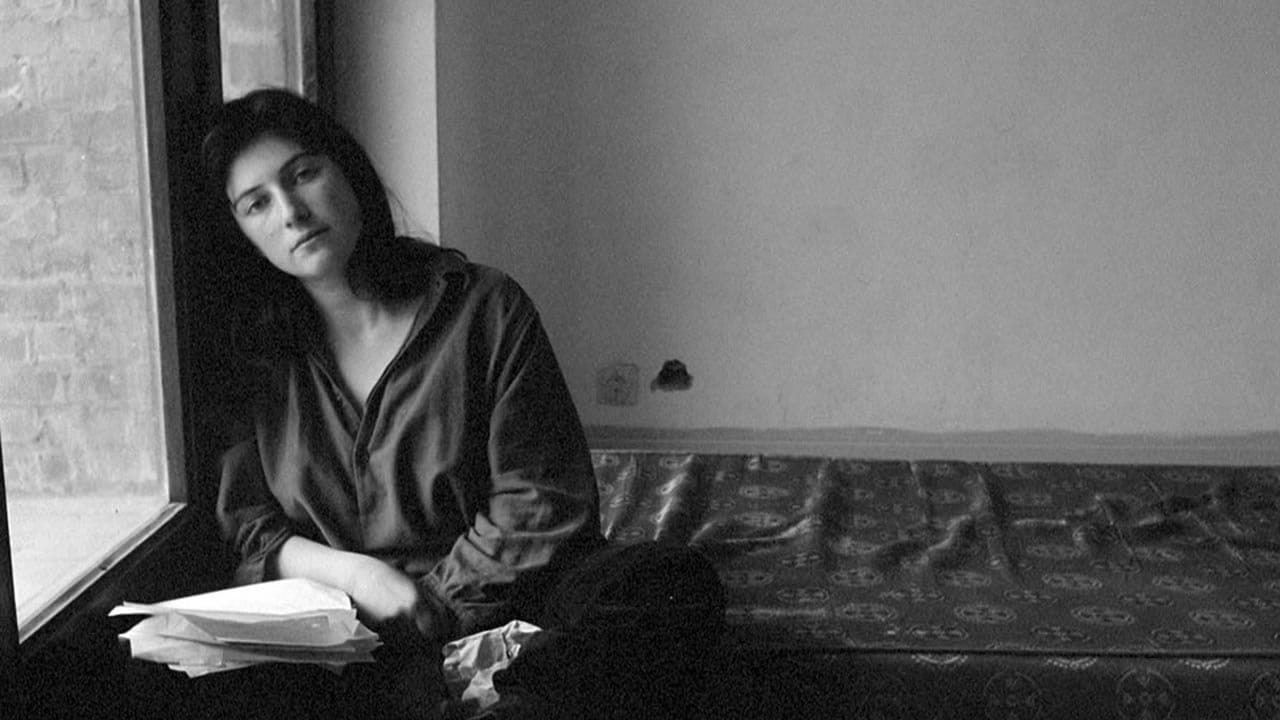
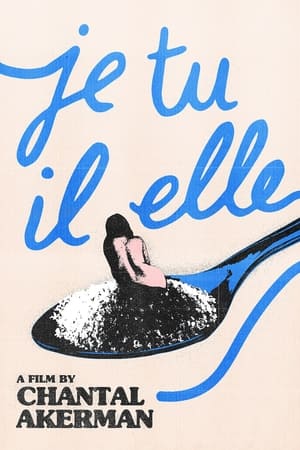
Je Tu Il Elle
1974 • 1h 26min • ★ 6.552/10 • Belgium
Directed by: Chantal Akerman
Cast: Chantal Akerman, Niels Arestrup, Claire Wauthion
A woman suffers a subdued psychological breakdown in the wake of a devastating breakup.
“Je Tu Il Elle” is a 1974 film directed by Chantal Akerman. The film tells the story of a young woman named Julie who is trapped in a state of emotional and creative stasis.
After breaking up with her girlfriend, Julie isolates herself in her apartment and begins to obsess over her former lover. She spends her days rearranging the furniture, writing letters, and eating spoonfuls of sugar.
As the film progresses, Julie’s isolation becomes increasingly suffocating, and she decides to leave her apartment and embark on a road trip.
If you like Chantal Akerman’s work, on our sister site AuteurGraph we have a profile page, a visual film timeline, and a ratings page that gives a tonne of info and data about their career in a visualized form.
She hitches a ride with a truck driver named Jean, and the two of them embark on a strange and elliptical journey through the French countryside.
Along the way, they pick up a young woman named Claire and spend a night together in a hotel room.
“Je Tu Il Elle” is a film that is both deeply personal and highly experimental. Its use of long takes, static shots, and elliptical editing create a sense of existential unease and dislocation, and its themes of isolation, desire, and identity resonate long after the film has ended.
3. The Meetings of Anna (1978)

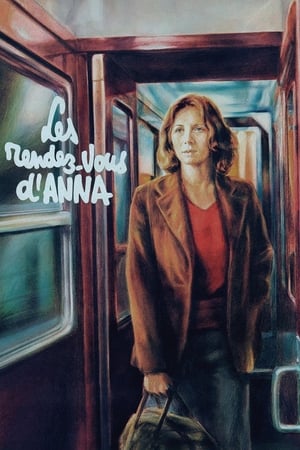
The Meetings of Anna
1978 • 2h 8min • ★ 7.2/10 • Belgium
Directed by: Chantal Akerman
Cast: Aurore Clément, Helmut Griem, Magali Noël, Hanns Zischler, Jean-Pierre Cassel
On a trip across Western Europe to promote her newest release, filmmaker Anna encounters several individuals—familiar and otherwise—and attends to their discontents.
“The Meetings of Anna” is a 1978 film directed by Agnes Varda. The film tells the story of Anna (played by Aurore Clément), a successful filmmaker who travels to various European cities to present her latest film.
As she travels, Anna encounters different people and experiences, each of which makes her reflect on her own life and the choices she has made.
The film is a meditation on the meaning of human connection and the role of art in our lives. As Anna travels, she is confronted with the emotional distance she feels from the people around her and struggles to find a sense of belonging.
The film is characterized by Varda’s signature visual style, with striking compositions and an attention to the small details of everyday life.
“The Meetings of Anna” is a quiet and reflective film that offers a subtle exploration of the human experience.
It is a film that encourages us to reflect on the ways in which our lives are shaped by the people we meet and the experiences we have.
It is a powerful reminder of the importance of human connection and the role that art can play in helping us to make sense of our lives.
4. News from Home (1976)
“News from Home” is a 1976 film directed by Agnes Varda. The film is a meditative exploration of the immigrant experience in New York City, told through a series of letters sent by Varda’s son, who is living in the city, and paired with images of the city’s streets and architecture.
The film offers a nuanced and often poetic portrayal of the city, with its bustling streets and diverse inhabitants.
It also offers a portrait of the immigrant experience, with the letters from Varda’s son providing a window into the struggles and triumphs of those who have come to the city seeking a better life.
At the same time, the film also reflects on the nature of memory and the passage of time.
The images of the city, captured in long, lingering shots, suggest a certain timelessness, while the letters from Varda’s son serve as a reminder of the inevitability of change and the passing of generations.
“News from Home” is a unique and deeply affecting film that offers a poignant reflection on the immigrant experience and the nature of memory.
It is a testament to Varda’s talent as a filmmaker and her ability to find beauty and meaning in the seemingly mundane details of everyday life.
5. From the East (1993)
“From the East” is a 1993 documentary film directed by Chantal Akerman. The film is a poetic exploration of Eastern Europe and the former Soviet Union, as seen through the eyes of an outsider.
Akerman travels through Poland, the Ukraine, and Russia, capturing a series of images and moments that reveal the beauty, tragedy, and complexity of life in these regions.
The film is structured around a series of long takes, each lasting several minutes, that capture the rhythms of everyday life in these countries.
These moments range from the mundane to the profound, and Akerman’s use of static shots and ambient sound creates a powerful sense of immersion and presence.
The film’s visuals are complemented by a haunting score that blends traditional folk music with contemporary sounds, creating a sense of timelessness and universality.
“From the East” is a film that challenges conventional notions of documentary filmmaking, rejecting traditional narrative structures and storytelling techniques.
Instead, Akerman uses cinema to create a space for contemplation and reflection, inviting viewers to immerse themselves in a world that is both strange and familiar.
The film is a powerful exploration of the complexities of human experience, and it continues to resonate with audiences today as a powerful meditation on the beauty and tragedy of life.
- Factory sealed DVD
- n/a (Actor)
- Chantal Akerman (Director)
- English (Subtitle)
- English (Publication Language)
6. The Captive (2000)
“The Captive” is a 2000 film directed by Chantal Akerman. The film tells the story of a woman named Ariane, who has just moved to a new apartment in Paris with her boyfriend Gerardo.
Ariane is a translator and spends most of her days alone in the apartment, working on a new translation of a novel.
As the days go by, Ariane becomes increasingly disconnected from the world around her.
She spends long periods of time staring out the window, and her relationship with Gerardo becomes strained. Meanwhile, a series of mysterious phone calls and visits from a stranger add to the growing sense of unease and isolation.
Akerman’s use of long takes and static shots creates a powerful sense of tension and unease, as the camera lingers on the details of Ariane’s mundane daily life.
The film’s spare and minimalist style highlights the emotional weight of even the smallest gestures, and its use of silence and absence creates a sense of haunting emptiness.
“The Captive” is a film that is both deeply personal and highly abstract. Its themes of loneliness, disconnection, and the elusive nature of human connection resonate long after the film has ended.
Akerman’s unique vision and experimental style create a powerful and haunting meditation on the complexities of human emotion and experience.
7. Toute une nuit (1982)
“Toute une nuit” (1982) is a film directed by Agnes Varda that explores the interconnected lives of a group of Parisians over the course of one night.
The film is structured as a series of vignettes, each focusing on a different character or group of characters, as they navigate the city and their relationships with one another.
The film is characterized by Varda’s signature visual style, with striking compositions and a focus on the small details of everyday life.
The film captures the energy and mood of the city at night, with its neon lights, empty streets, and the sound of distant music.
As the night unfolds, the characters’ paths intersect in unexpected ways, leading to chance encounters and moments of connection.
The film explores the complexities of human relationships, from the fleeting connections of strangers to the long-term bonds of family and lovers.
“Toute une nuit” is a lyrical and nuanced film that captures the beauty and mystery of the night. It is a meditation on the fleeting nature of human connection and the role that chance plays in our lives.
It is a testament to Varda’s skill as a filmmaker, as she weaves together a complex tapestry of human experience through a series of intimate and poignant moments.
8. La chambre (1972)
“La chambre” is a French film directed by Chantal Akerman and released in 1972. It is an experimental film that follows a woman as she performs various daily tasks in a small, sparsely furnished apartment.
The film is notable for its use of long, static shots and minimal dialogue, creating a sense of stillness and contemplation.
The camera remains fixed in one position for minutes at a time, allowing the audience to observe the woman’s actions and surroundings in great detail.
“La chambre” has been described as a feminist film, as it explores the idea of a woman’s domestic space and the routine activities that make up her daily life.
The film has been praised for its unique style and its ability to capture the beauty in the mundane.
Overall, “La chambre” is an important work in the history of experimental film and a powerful meditation on the experience of being a woman in a domestic setting.
- Mallet Joris Fr. (Author)
- French (Publication Language)
- 01/01/1972 (Publication Date) - René Julliard (Publisher)
9. Hôtel Monterey (1973)
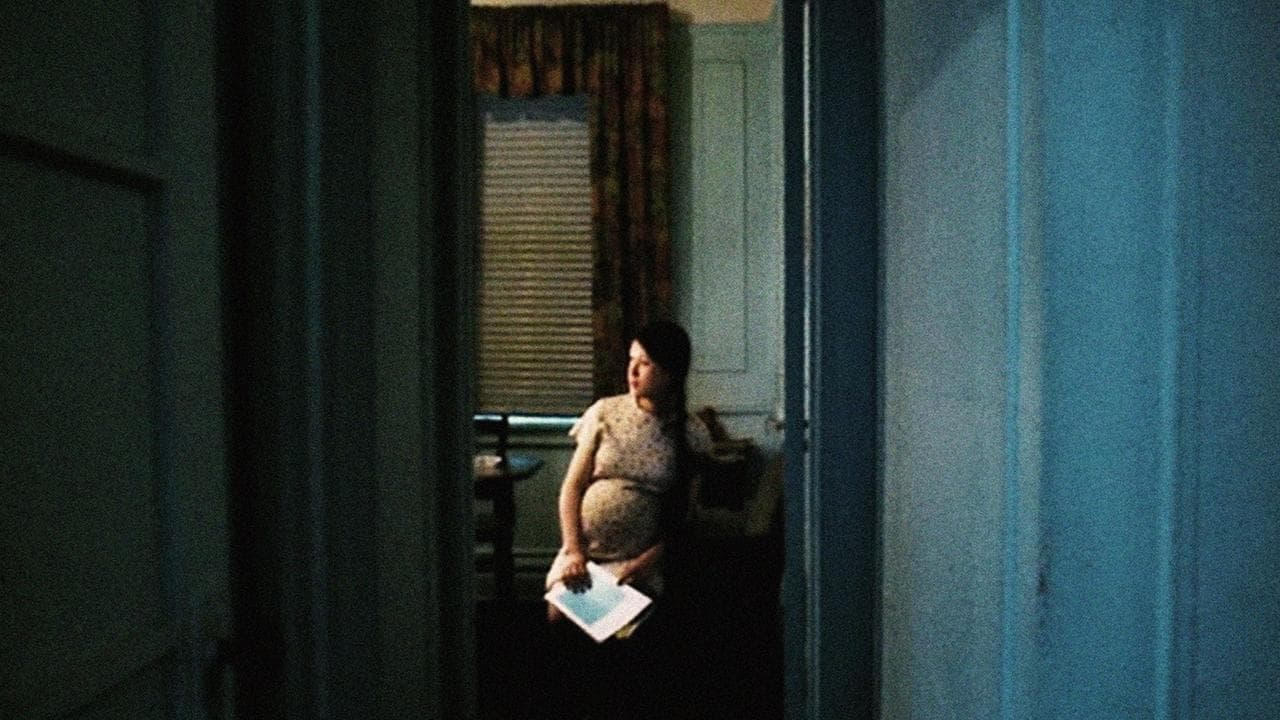
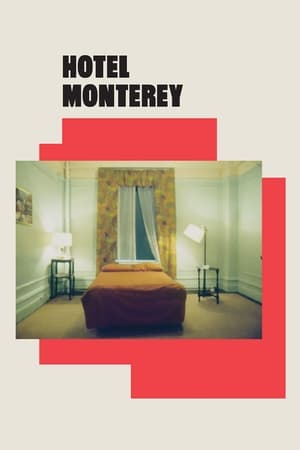
Hotel Monterey
1973 • 1h 3min • ★ 6.25/10 • Belgium
Directed by: Chantal Akerman
Hotel Monterey is a cheap hotel in New York reserved for the outcasts of American society. Chantal Akerman invites viewers to visit this unusual place as well as the people who live there, from the reception up to the last story.
“Hôtel Monterey” (1973) is a short film directed by Agnes Varda that is set in a run-down hotel in New York City.
The film is structured as a series of tableaux, each offering a glimpse into the lives of the hotel’s inhabitants, who are largely anonymous and disconnected from one another.
The film is notable for its use of light and shadow, with Varda’s camera capturing the play of light on the hotel’s walls and floors.
The film is also characterized by its attention to the small details of everyday life, from the sound of a dripping faucet to the pattern of a carpet.
“Hôtel Monterey” is a haunting and evocative film that captures the sense of isolation and anonymity that can come with living in a large city.
It is a film that encourages us to look more closely at the world around us and to find beauty in the seemingly mundane details of everyday life.
At the same time, the film is a powerful reminder of the importance of human connection and the role that empathy and understanding can play in overcoming feelings of isolation and loneliness.
10. A Couch in New York (1996)
“A Couch in New York” is a 1996 romantic comedy directed by Chantal Akerman, a Belgian filmmaker known for her experimental films.
The movie is in English and stars William Hurt and Juliette Binoche in the lead roles.
The plot of the movie follows two characters, Henry Harriston (William Hurt), a psychoanalyst from New York, and Beatrice Saulnier (Juliette Binoche), a free-spirited dancer from Paris.
Both characters are seeking a change in their lives and decide to exchange apartments for a few weeks, hoping to find what they are looking for.
The film explores the cultural differences and language barriers between the two characters as they adjust to living in each other’s homes.
As they become more familiar with each other’s lives, they start to develop an unlikely romantic connection.
“A Couch in New York” is a lighthearted and charming film that explores themes of love, identity, and cultural differences.
The movie is notable for its use of humor and its exploration of the differences between American and French culture. It was praised for the chemistry between the lead actors and the warm and intimate atmosphere that the film creates.
- Juliette Binoche, William Hurt, Stephanie Buttle (Actors)
- Chantal Akerman (Director) - Chantal Akerman (Writer)
- English (Subtitle)
- Audience Rating: R (Restricted)
3 Characteristics of Chantal Akerman Films
Chantal Akerman was a Belgian filmmaker who created a diverse body of work over the course of her career. Here are some characteristics of her films:
Long takes: One of Akerman’s most distinctive techniques was the use of long takes, in which the camera remains fixed on a single shot for an extended period of time.
This creates a sense of contemplation and stillness, allowing viewers to observe the action on screen in real time.
Domestic spaces: Akerman’s films often take place in domestic spaces, such as kitchens and bedrooms. These spaces are often presented in a minimalistic, almost clinical manner, with little decoration or personal touches.
Everyday life: Akerman’s films often focus on the small details of everyday life, such as the preparation of food or the completion of household chores.
These moments are presented with a sense of intimacy and realism, and are often used to explore larger themes of identity, gender, and power.
Minimal dialogue: Many of Akerman’s films have very little dialogue, with characters communicating through non-verbal cues and actions. This creates a sense of distance and alienation, and emphasizes the isolation and loneliness of her characters.
3 Reasons Why You Should Watch Chantal Akerman Films
Chantal Akerman is a Belgian filmmaker and artist known for her innovative and experimental approach to cinema. Here are some reasons why you should watch Chantal Akerman films:
Her films are visually stunning: Akerman’s films are known for their beautiful, minimalist compositions and use of long takes. Her work often explores the relationship between space and time, and her use of stillness and silence can be breathtaking.
She is a feminist icon: Akerman’s films often explore the experiences of women in society, and she is considered a pioneering feminist filmmaker. Her work challenges traditional notions of gender roles and offers a fresh perspective on the lives of women.
She is a master of the art film: Akerman’s films are often slow-paced and introspective, requiring the viewer to engage with the material on a deeper level. Her work is intellectually stimulating and emotionally moving.
She pushes the boundaries of cinema: Akerman’s films are known for their experimental approach to form and content. She often blurs the line between fiction and documentary and explores the possibilities of the film medium.
Her films are deeply humanistic: Despite her experimental approach to filmmaking, Akerman’s work is always grounded in a profound empathy for her characters. Her films are often deeply moving and offer a poignant insight into the human experience.
Best Chantal Akerman Films – Wrapping Up
Chantal Akerman created a diverse body of work over the course of her career, spanning experimental films, documentaries, and narrative features. Here are some of her most highly-regarded films:
“Jeanne Dielman, 23 Quai du Commerce, 1080 Bruxelles” (1975) – Akerman’s most famous film, a three-and-a-half-hour exploration of the daily routine of a widowed mother and part-time sex worker, which is disrupted by a series of events.
“News from Home” (1977) – a personal and poignant documentary film that uses Akerman’s own letters from her mother as narration, while showing scenes of New York City in the 1970s.
“Les Rendez-vous d’Anna” (1978) – a semi-autobiographical film following a film director on a tour of Europe and the people she meets along the way.
“From the East” (1993) – a meditative travelogue of Akerman’s journey across Eastern Europe, featuring long takes of landscapes and cultural scenes.
“No Home Movie” (2015) – a deeply personal documentary, which is Akerman’s final film, that explores her relationship with her mother and themes of family, identity, and mortality.
Overall, Akerman’s work is marked by a sense of stillness, contemplation, and attention to the small details of everyday life.
Her films often explore themes of gender, power, and identity, and challenge traditional notions of femininity and domesticity.





![News From Home [VHS]](https://m.media-amazon.com/images/I/517V13QZPML.jpg)






![A Couch in New York [DVD]](https://m.media-amazon.com/images/I/41t6cFCoTkL.jpg)
